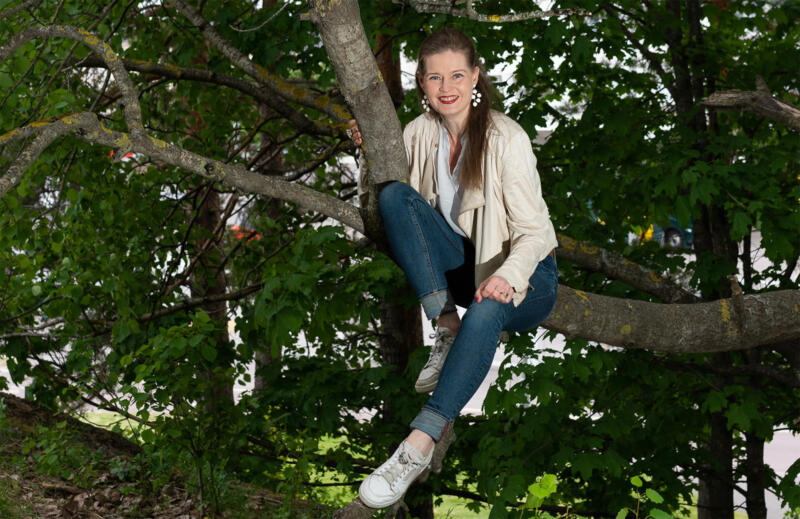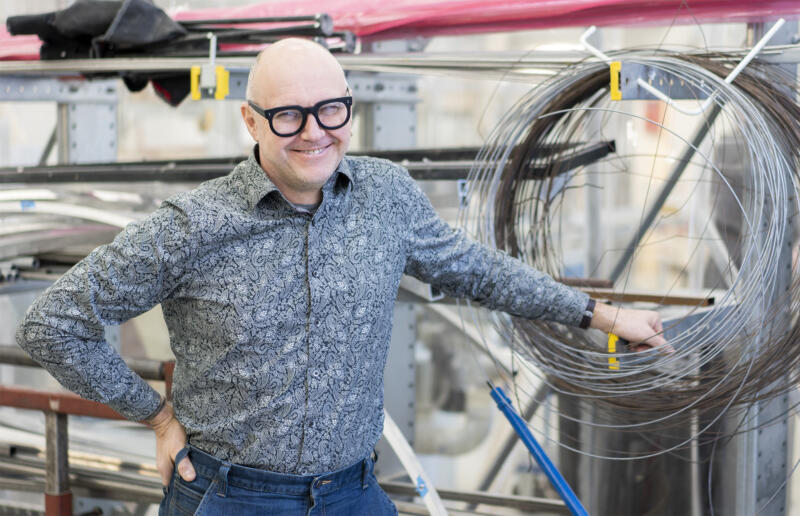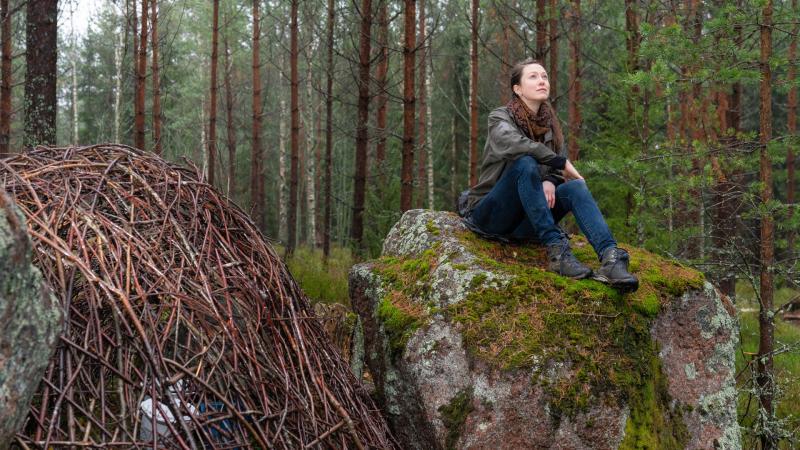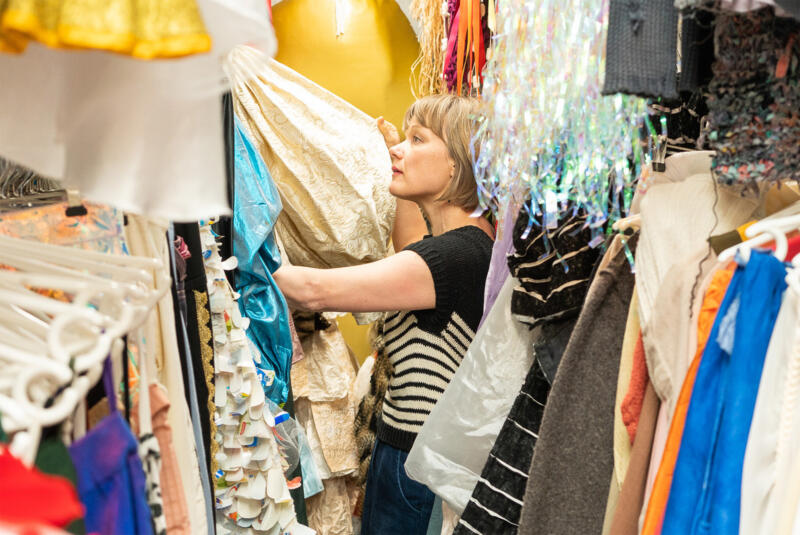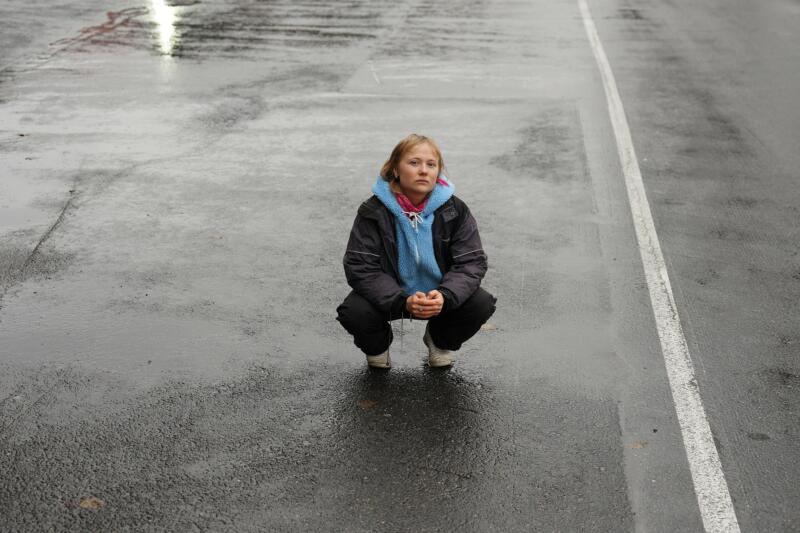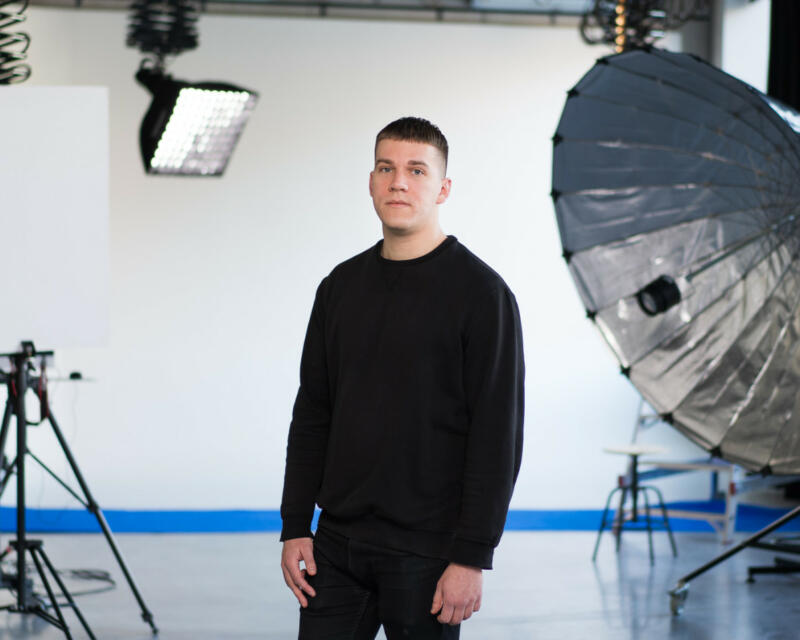Uniarts Helsinki’s environmental programme
This environmental programme states the concrete measures that will help Uniarts Helsinki contribute to a more sustainable future.
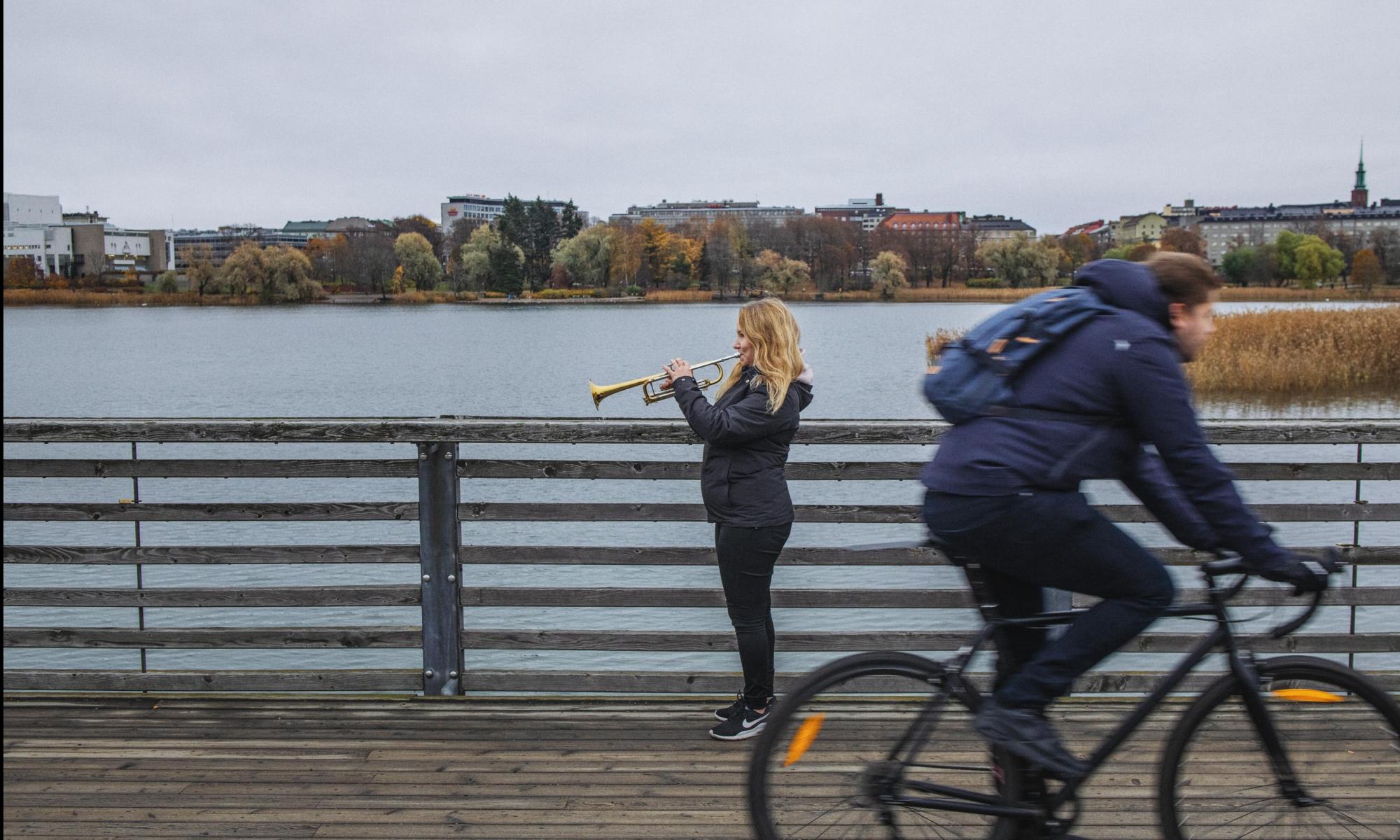
Introduction: Art is part of the solution to the ecological sustainability crisis
One of the six main goals of Uniarts Helsinki’s strategy is that art is part of the solution to the ecological sustainability crisis. This environmental programme states the concrete measures that will help Uniarts Helsinki contribute to a more sustainable world. In the future, we will include knowledge of ecological sustainability issues and sustainable practices more widely than before in our multidisciplinary teaching, research and artistic activities. We will also reduce our use of natural resources and emissions to a sustainable level so that our operations are carbon neutral by 2030.
The environmental programme document has three main themes, resulting in a total of 19 measures. The goals and measures of the environmental programme were defined in 2022 through a process where all members of the community had the chance to influence the content of the programme. The programme has been updated and elaborated in 2024 by the steering group for ecological sustainability and by the executive group of Uniarts Helsinki.
You can also find tips for more sustainable office work, travel, purchases and event organisation at Uniarts Helsinki.
1. Teaching, research and artistic activities
Our aim is that graduates of Uniarts Helsinki lead the way in showing what social, cultural and artistic agency can mean when it is also ecologically sustainable. Every year, hundreds of new graduates from Uniarts Helsinki pursue careers as artists, pedagogues, researchers and other experts in the arts sector. They all can pave the way for the sustainability transition in their own artistic activities and by working in various sectors of society.
Uniarts Helsinki’s learning and research environment gives students tools needed for critical thinking, increases their understanding on environmental issues and helps them see and create opportunities for art to contribute to solving various sustainability crises. Our research deepens the development work in various artistic disciplines and opens up new perspectives on the range of ways that art can be linked to sustainability issues.
Besides carrying out teaching and research, we organise about 700 public artistic performances, concerts, exhibitions or other events each year. Teaching, research and artistic activities also provide a context for experimenting with and developing ecologically sustainable artistic practices in practice.
Theme 1: Measures
- We include ecological sustainability in a cross-cutting manner in Uniarts Helsinki’s teaching.
- We improve the existing teaching offered concerning ecological sustainability themes and practices and also develop new study opportunities.
- We continue offering the courses included in the Climate University network’s selection to Uniarts Helsinki’s students.
- We present our upcoming sustainability- themed courses as part of the potential selection of suitable networks.
- We develop and adopt sustainable and responsible practices for doctoral education and research. We include ecological themes and practices as part of the new curricula for doctoral When possible, we take sustainability themes into consideration in Uniarts Helsinki’s project funding applications.
- We develop and adopt sustainable practices for artistic work. We establish academy-specific sustainability guidelines for artistic work.
- We support the Uniarts Helsinki community’s collective learning about ecological sustainability and sharing of sustainable practices by organising low-threshold meetings concerning sustainability and by maintaining a shared list of literature and links.
- We promote the role of art and arts education in society and make it possible for art to have a new kind of impact in the sustainability transition in cooperation with operators in the arts sector and other stakeholders.
Theme 1: Goals
- Ecological sustainability themes are extensively part of Uniarts Helsinki’s teaching. (Target year 2030)
- Uniarts Helsinki’s teaching concerning ecological sustainability themes and practices is extensive and available to all students. (Continuous)
- We have started offering a sustainability-themed study unit as part of the selection of a selected network of sustainability studies. (2028)
- The sustainability-related goals and measures for research and doctoral education have been defined and some of the measures have been taken. The sustainability-related goals and measures for research and doctoral education have been defined and some of the measures have been taken. (2026)
- Sustainability guidelines have been compiled, published and integrated into student orientation. (2026)
- We have regularly organised low-threshold meetings. We have maintained and updated the shared literature and link list. (Continuous)
- We are active participants in our chosen cooperation networks. (Continuous)
2. Sustainable daily activities and reducing our environmental load
We build a sustainable and environmentally friendly Uniarts Helsinki through the joint effort of the entire university community. Sustainable daily choices are aided through guidelines concerning facilities, travelling and procurement and through various development measures. Our goal of reaching carbon neutrality by 2030 requires that we have an ecologically sustainable organising culture and that each member of Uniarts Helsinki finds their own role in promoting ecological sustainability and contributes to the work of spreading sustainable practices.
Theme 2: Measures
- We monitor the progress of the emission reduction plan as part of the reporting of the environmental programme and update the plan, if necessary.
- We communicate our environmental impact openly on our website.
- We engage in high-quality offsetting of the remaining carbon footprint starting from 2030 on a yearly basis.
- In procurement, we include responsibility- related criteria in our invitations to tender and collect information on the responsibility of our suppliers with the help of Uniarts Helsinki’s supplier questionnaire.
- We reduce the environmental burden caused by work-related travelling with the help of travel policies and guidelines and an internal support scheme designed for carbon offsetting flights and sustainable travelling.
- We reduce the environmental burden from the use of facilities in cooperation with the lessors by optimising the energy efficiency of our building technology. We maximise the utilisation rate of the facilities when they are in use.
- We strengthen the responsibility of our investments in cooperation with our asset managers in accordance with our investment policy.
- We reduce the amount of mixed waste and waste-to-energy that we produce and increase the recycling rate by improving our sorting and recycling possibilities and instructions on campus.
Theme 2: Goals
- Carbon neutrality 2030. Sub-goals in the emission reduction plan. Introduction of the calculation of negative nature impacts, once the method is refined enough so that it makes sense to start using it alongside the carbon calculation with similar methods and baseline information. (Target year continuous)
- A carbon offsetting plan has been made and compensation sums have been budgeted. (2030)
- Stated in the document “Guide to ecologically and socially responsible procurement”. (Continuous)
- Sub-goals in the emission reduction plan. (2030)
- Sub-goals in the emission reduction plan. (2028)
- Goals have been defined in the investment policy. For Uniarts Helsinki, what is essential is that the selected asset manager partners have functioning monitoring and reporting processes for responsibility goals. (Continuous)
- Goals are defined based on the baseline in the waste report for 2023. (2028)
3. Structures and management
Our existing structures and management principles provide the framework and the right circumstances for a sustainable operating culture and for committing to ecological sustainability at Uniarts Helsinki. Our management principles enable the promotion of a sustainable culture and sustainable practices, and we set an example on how environmental sustainability is taken into consideration in everyday choices as well as in decisions concerning the university’s operations.
We include sustainability and responsibility measures and their monitoring as part of Uniarts Helsinki’s yearly recurring processes. We consider the impact that decisions have on the university’s environmental load and the goal of carbon neutrality more carefully than before in decision-making and budgeting. We strengthen the university community’s sustainability knowhow by offering guides, training and tools.
We are not going through the sustainability challenges alone. That is why we actively cooperate with our partners and stakeholders to contribute to a more sustainable future and communicate openly about our activities.
Theme 3: Measures
- We monitor the progress of the environmental programme in the yearly process of operations management and update the programme if necessary. We report on the progress of the environmental programme on a yearly basis as part of other yearly reporting. We utilise the report in operations management and decision-making. If necessary, we develop the process by utilising the improvement recommendations given after the audit of the quality system.
- We suggest that the realisation of sustainability and responsibility would be the theme of risk management in 2026. We assess the implementation of the environmental programme after the end of the strategic project for ecological sustainability in 2025- 2026. We assess the division of responsibilities and related arrangements and resource allocation based on the results.
- We foster the consideration and promotion of ecological sustainability in supervisor work, decision-making and management by organising training seminars and by maintaining guides and making the community aware of them. We monitor the promotion of ecological sustainability in performance reviews with staff.
- We improve the entire university community’s sustainability-related competence in their personal work and studies by organising training seminars and by improving the guides we offer. We examine the community’s competence in ecological sustainability as part of the university’s training and HR planning.
- We cooperate only with partners that operate sustainably and responsibly.
Theme 3: Goals
- The environmental programme is part of the operations management process, and it steers the operations of the academies and units. (Target year continuous)
- Assessments have been completed. (2026)
- Ecological sustainability is taken into consideration in a) performance review forms and b) support materials for supervisors. (Continuous)
- Guides and training content are updated and improved, and staff makes use of them. (Continuous)
- Uniarts Helsinki has up-to- date practices utilised for assessing the responsibility of partners. (Continuous)
Contact
-
Katariina Kivistö-Rahnasto
- Planning Manager, Development services Academy of Fine Arts, Academy of Fine Arts
- +358456578264
- katariina.kivisto-rahnasto@uniarts.fi
